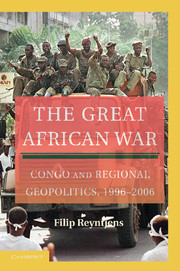Book contents
- Frontmatter
- Contents
- Acknowledgements
- List of Maps
- Introduction
- 1 A Region in Turmoil
- 2 The ‘War of Liberation’
- 3 Massacre of the Rwandan Refugees
- 4 The Fall of the Mobutist State
- 5 Congo: Waiting for Another War
- 6 Impasse in Rwanda and Burundi
- 7 ‘The First African World War’
- 8 Negotiating the Transition
- Conclusion
- Appendix 1 Sources on the killings of Rwandan refugees in early 1997
- Appendix 2 Chronology
- Appendix 3 List of abbreviations
- References
- Index
8 - Negotiating the Transition
Published online by Cambridge University Press: 18 December 2009
- Frontmatter
- Contents
- Acknowledgements
- List of Maps
- Introduction
- 1 A Region in Turmoil
- 2 The ‘War of Liberation’
- 3 Massacre of the Rwandan Refugees
- 4 The Fall of the Mobutist State
- 5 Congo: Waiting for Another War
- 6 Impasse in Rwanda and Burundi
- 7 ‘The First African World War’
- 8 Negotiating the Transition
- Conclusion
- Appendix 1 Sources on the killings of Rwandan refugees in early 1997
- Appendix 2 Chronology
- Appendix 3 List of abbreviations
- References
- Index
Summary
The Political Landscape
The Regime in Kinshasa
In Chapter 5, I discussed the nature of the Congolese regime, between Laurent Kabila's coming to power and the outbreak of the second war. Despite the new conflict and the occupation of more than half the national territory by rebel and foreign forces, the regime continued to attempt to institutionalise (in the sense indicated in the text later) its authoritarian rule. As will be seen, at the same time Kabila was blocking attempts to find a negotiated settlement to the military conflict. This dual attitude was inspired by one and the same consideration: giving in to demands for power-sharing by either or both the opposition forces and the rebel groups would have been a major threat to his position. Although there was no state worth mentioning and while half the national territory was outside government control, Kabila represented a sovereign legal entity recognised by the international community. This recognition of juridical, rather than empirical statehood, gave him an edge over his challengers, at least in the short run, and it allowed him to get away with an erratic mode of governance, which external partners, both African and more broadly international, disliked but were unable or unwilling to counter. It also allowed Kabila to ‘play state’ and to try to create the impression of institutional/legal normality.
A constitutional commission established in October 1997 thus adopted a draft constitution in March 1998, and a law-decree of 25 May 1998 provided for the creation of a Constituent and Legislative Assembly. The constitutional process was to be firmly controlled by the president, and the war only reinforced this tendency.
- Type
- Chapter
- Information
- The Great African WarCongo and Regional Geopolitics, 1996–2006, pp. 232 - 278Publisher: Cambridge University PressPrint publication year: 2009



